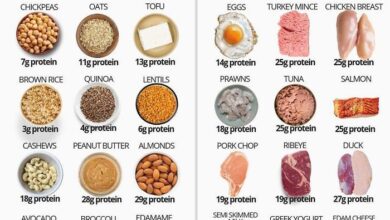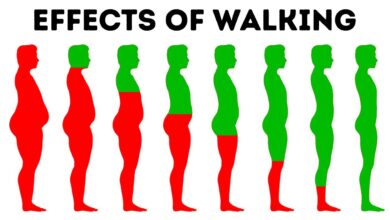
Habits to Supercharge Weight Loss the Right Way
Habits to supercharge weight loss the right way are not just about counting calories and hitting the gym. It’s about creating a lifestyle shift that prioritizes sustainable changes and focuses on both physical and mental well-being. Imagine waking up each day feeling energized, confident, and in control of your health journey, fueled by healthy habits that empower you to reach your weight loss goals.
This guide will equip you with the knowledge and strategies to build healthy habits that will transform your relationship with food, exercise, and your overall health. We’ll explore the science behind weight loss, set realistic goals, and dive into the practical steps you can take to create a sustainable and enjoyable weight loss journey.
Understanding the Science of Weight Loss
To achieve sustainable weight loss, it’s crucial to understand the fundamental principles governing weight management. This involves comprehending the relationship between calorie intake and expenditure, the role of metabolism, and the influence of key hormones on appetite regulation.
Calorie Intake and Expenditure
Weight loss occurs when you burn more calories than you consume. This principle is based on the law of energy conservation, which states that energy cannot be created or destroyed, only transformed. In the context of weight management, calories represent units of energy.
When you eat, you consume calories that your body utilizes for various functions like breathing, digestion, and physical activity. If you consume more calories than your body burns, the excess energy is stored as fat, leading to weight gain. Conversely, when you burn more calories than you consume, your body draws upon stored fat reserves, resulting in weight loss.
Metabolism
Metabolism refers to all the chemical processes that occur within your body to sustain life. It involves breaking down food for energy (catabolism) and building new cells and tissues (anabolism). Your metabolic rate, the speed at which your body burns calories, plays a significant role in weight management.
Factors that influence your metabolic rate include age, gender, muscle mass, and genetics.
The more muscle mass you have, the higher your metabolic rate, as muscles require more energy to function.
Hormones Involved in Appetite Regulation
Hormones act as chemical messengers that regulate various bodily functions, including appetite. Key hormones involved in appetite regulation include:
- Leptin:Produced by fat cells, leptin signals to your brain that you are full, suppressing appetite.
- Ghrelin:This hormone, secreted by the stomach, stimulates appetite, making you feel hungry.
- Insulin:While primarily known for its role in regulating blood sugar, insulin also influences appetite.
These hormones interact in complex ways to regulate your hunger and satiety levels. For instance, when you eat, your body releases leptin, which signals fullness and reduces appetite. Conversely, when you haven’t eaten for a while, ghrelin levels rise, prompting hunger.
Understanding the interplay of these hormones can provide insights into effective strategies for managing appetite and weight loss.
It’s not just about shedding pounds, it’s about building healthy habits that last a lifetime. Remember, the choices you make today can have a significant impact on your future well-being. Learning about the long term effects of losing weight even when youre young can be incredibly motivating, reminding us that investing in our health now pays off for years to come.
So, let’s prioritize those healthy habits, nourish our bodies with nutritious foods, and move our bodies regularly, setting ourselves up for a healthier, happier future.
Setting Realistic Goals and Expectations: Habits To Supercharge Weight Loss The Right Way
It’s easy to get caught up in the excitement of starting a weight loss journey and set ambitious goals. However, setting realistic expectations is crucial for long-term success. Aiming for a drastic weight loss in a short period can lead to frustration, burnout, and ultimately, giving up.
Instead, focus on making gradual and sustainable changes that you can maintain over time.
Gradual and Sustainable Weight Loss
The American Academy of Nutrition and Dietetics recommends a healthy weight loss of 1-2 pounds per week. This gradual approach allows your body to adapt to the changes and makes it easier to maintain your progress. Focusing on sustainable weight loss is crucial because it’s about making lifestyle changes that you can maintain long-term.
Benefits of Focusing on Overall Health
While weight loss is often a primary goal, focusing on overall health is essential for a fulfilling and healthy life. It involves prioritizing aspects like:* Regular physical activity:Aim for at least 150 minutes of moderate-intensity aerobic activity or 75 minutes of vigorous-intensity aerobic activity per week, as recommended by the Centers for Disease Control and Prevention.
Healthy eating habits This involves consuming a balanced diet rich in fruits, vegetables, whole grains, and lean protein.
Stress management Chronic stress can lead to weight gain and other health problems. Engage in activities that help you relax and de-stress, such as yoga, meditation, or spending time in nature.
Adequate sleep Aim for 7-8 hours of quality sleep each night to promote overall health and well-being.
Focusing on these aspects of health can lead to a healthier lifestyle and overall well-being, regardless of weight loss.
Building Healthy Habits for Sustainable Weight Loss
Now that you understand the science behind weight loss and have set realistic goals, it’s time to focus on building healthy habits that will support your journey. This is where the real transformation happens, moving beyond temporary changes and embracing a sustainable lifestyle.
Sample Meal Plan for a Balanced Diet
A balanced diet is crucial for weight loss and overall health. It should include a variety of whole foods from all food groups, focusing on nutrient-dense options. Here’s a sample meal plan that incorporates this principle: Breakfast:
- Oatmeal with berries and nuts
- Greek yogurt with fruit and granola
- Scrambled eggs with whole-wheat toast and avocado
Lunch:
- Salad with grilled chicken or fish
- Leftover dinner
- Whole-wheat wrap with hummus and vegetables
Dinner:
- Baked salmon with roasted vegetables
- Chicken stir-fry with brown rice
- Lentil soup with whole-wheat bread
Snacks:
- Fruits and vegetables
- Nuts and seeds
- Yogurt
This is just a sample meal plan, and you can adjust it to fit your individual needs and preferences. The key is to prioritize whole foods, such as fruits, vegetables, lean protein, and whole grains.
Designing a Workout Routine
A balanced workout routine that combines cardiovascular exercise and strength training is essential for weight loss and overall fitness. Cardiovascular exercise, such as running, swimming, or cycling, helps burn calories and improve your cardiovascular health. Strength training builds muscle mass, which helps boost your metabolism and burn more calories even at rest.Here’s a sample workout routine: Cardio:
Building healthy habits is key to sustainable weight loss, and it’s not always about drastic measures. Sometimes, it’s about finding tools that help you track and understand your body’s needs, like Kelsey did when she discovered MyFitnessPal after a crash diet left her feeling depleted.
Read more about her journey and how it led to healthier habits in this inspiring story: how a crash diet led kelsey to myfitnesspal and much healthier habits. Kelsey’s experience reminds us that sustainable weight loss is about making positive changes you can stick with, not about quick fixes.
30 minutes of moderate-intensity cardio, such as brisk walking, jogging, or cycling, 3-5 times per week.
Strength Training:2-3 strength training sessions per week, focusing on all major muscle groups. You can use bodyweight exercises, resistance bands, or weights. Example Strength Training Routine:
- Squats (3 sets of 10-12 repetitions)
- Push-ups (3 sets of as many repetitions as possible)
- Lunges (3 sets of 10-12 repetitions per leg)
- Plank (hold for 30-60 seconds)
Remember to warm up before each workout and cool down afterward.
Staying Hydrated Throughout the Day
Staying hydrated is crucial for overall health and can also help with weight loss. Water helps regulate your body temperature, flushes out toxins, and can even help you feel fuller, which can reduce your calorie intake.Here are some tips for staying hydrated throughout the day:* Carry a reusable water bottle with you.
- Drink water before, during, and after meals.
- Choose water over sugary drinks.
- Eat fruits and vegetables that are high in water content, such as watermelon, cucumber, and spinach.
- Monitor your urine color.A light yellow color indicates that you are adequately hydrated.
The Importance of Sleep for Weight Loss
Sleep is essential for overall health and can also play a role in weight management. When you don’t get enough sleep, your body produces more of the stress hormone cortisol, which can lead to increased appetite and fat storage.Here are some tips for getting enough sleep:* Establish a regular sleep schedule.Go to bed and wake up at the same time each day, even on weekends.
- Create a relaxing bedtime routine.Take a warm bath, read a book, or listen to calming music.
- Make sure your bedroom is dark, quiet, and cool.
- Avoid caffeine and alcohol before bed.
- Get regular exercise, but avoid exercising too close to bedtime.
Stress Management Techniques for Weight Management
Stress can also lead to weight gain. When you’re stressed, your body produces cortisol, which can increase your appetite and lead to unhealthy food choices.Here are some stress management techniques that can aid in weight management:* Exercise:Regular physical activity can help reduce stress and improve your mood.
Meditation Meditation can help you relax and focus on the present moment.
Yoga Yoga combines physical poses with deep breathing exercises, which can help reduce stress and improve flexibility.
Building healthy habits is key to sustainable weight loss. It’s not just about hitting the gym every day, it’s about creating a lifestyle that supports your goals. If you’re looking for some inspiration, check out this list of 7 feats to add to your fitness bucket list – it might just spark some ideas for your own fitness journey.
Remember, the best way to achieve lasting results is to find activities you enjoy and incorporate them into your routine. So, get creative, have fun, and watch those healthy habits become second nature!
Spending time in nature Spending time in nature can help you relax and de-stress.
Connecting with loved ones Social support can help you cope with stress.
Mindful Eating and Portion Control
Mindful eating and portion control are crucial components of sustainable weight loss. They help you develop a healthy relationship with food, preventing overeating and promoting a balanced diet.
Mindful Eating Practices
Mindful eating is a practice that involves paying full attention to your food experience. It’s about savoring each bite, being aware of your hunger and fullness cues, and eating without distractions. Here are some mindful eating practices:
- Eat without distractions:Turn off the TV, put away your phone, and focus on your meal.
- Slow down:Chew your food thoroughly and take small bites.
- Listen to your body:Pay attention to your hunger and fullness cues. Stop eating when you feel comfortably satisfied, not stuffed.
- Choose foods you enjoy:Opt for foods that you find satisfying and pleasurable.
- Be present:Notice the colors, textures, and aromas of your food.
Understanding Portion Control, Habits to supercharge weight loss the right way
Portion control is about consuming appropriate amounts of food to meet your body’s needs without overeating. It’s not about restricting yourself but about making conscious choices about the quantity of food you consume. Here’s how portion control contributes to weight loss:
- Calorie management:Controlling portion sizes helps you manage your calorie intake, which is essential for weight loss.
- Improved satiety:Eating smaller portions can help you feel fuller for longer, reducing cravings and preventing overeating.
- Balanced nutrition:Portion control encourages you to consume a balanced diet by ensuring you get enough of each food group without overindulging in any particular category.
Strategies for Avoiding Overeating
- Use smaller plates:Serving food on smaller plates can trick your brain into thinking you’re eating more.
- Measure your food:Use measuring cups and spoons to ensure you’re consuming the appropriate portion sizes.
- Cook at home more often:Restaurant portions are often much larger than what you need. Cooking at home gives you more control over portion sizes.
- Eat slowly:It takes about 20 minutes for your brain to register fullness. Eating slowly gives your body time to signal that it’s satisfied.
- Stay hydrated:Drinking water before meals can help you feel fuller and reduce your overall calorie intake.
- Don’t skip meals:Skipping meals can lead to overeating later.
Staying Motivated and Consistent
Weight loss is a journey, not a sprint, and maintaining motivation is crucial for achieving your goals. It’s easy to get discouraged when you don’t see immediate results, but staying focused and consistent is key to success.
Tracking Progress and Celebrating Milestones
Tracking your progress is an excellent way to stay motivated. It allows you to see how far you’ve come and provides a visual representation of your achievements.
- Keep a food journal: This helps you track your calorie intake and identify areas where you can make improvements. It also helps you stay accountable and aware of your eating habits.
- Take progress pictures: This can be a powerful tool for visualizing your transformation.
Take pictures every week or two to see the gradual changes in your body.
- Measure your body composition: Use a scale that measures body fat percentage, muscle mass, and water weight. This provides a more comprehensive picture of your progress than just weight alone.
Celebrating your milestones is essential for maintaining momentum. It reinforces your commitment to your goals and provides positive reinforcement.
- Reward yourself: When you reach a goal, treat yourself to something you enjoy, but make sure it aligns with your overall health goals.
- Acknowledge your efforts: Take the time to recognize your hard work and dedication. This can be as simple as writing down your accomplishments in a journal or sharing them with a friend.
- Stay positive: Focus on the progress you’ve made, not on what you haven’t achieved yet. Celebrate the small victories along the way.
Tips for Staying Motivated When Facing Challenges
Weight loss is not always easy. There will be times when you feel discouraged or tempted to give up. It’s important to have strategies in place to help you stay motivated during these challenging times.
- Set realistic goals: Don’t aim for unrealistic weight loss targets. Aim for a healthy and sustainable rate of weight loss, typically 1-2 pounds per week.
- Focus on the process: Instead of dwelling on the end result, focus on making healthy choices each day.
- Find a support system: Surround yourself with people who encourage and support your weight loss journey.
- Visualize your success: Imagine yourself achieving your weight loss goals. This can help you stay motivated and focused.
- Remember your reasons: Remind yourself why you started this journey. What are your motivations for losing weight?
- Don’t give up: Everyone faces setbacks.
If you slip up, don’t beat yourself up. Get back on track as soon as possible.
Benefits of Finding a Support System
Having a support system can make a significant difference in your weight loss journey. It provides you with encouragement, accountability, and a sense of community.
- Emotional support: A support system can provide emotional support during challenging times.
- Accountability: Having someone to check in with can help you stay accountable to your goals.
- Motivation: A support system can provide motivation and encouragement when you’re feeling discouraged.
- Sharing experiences: Connecting with others who are also on a weight loss journey can help you feel less alone.
The Role of Exercise in Weight Loss

While diet plays a crucial role in weight loss, exercise is equally important for achieving sustainable results. Regular physical activity not only helps burn calories but also boosts metabolism, builds muscle mass, and improves overall health.
Types of Exercise and Their Benefits for Weight Loss
There are various types of exercise that can contribute to weight loss. Here’s a breakdown of some popular options and their benefits:
- Cardiovascular Exercise:This type of exercise, also known as aerobic exercise, elevates your heart rate and improves cardiovascular health. Examples include running, swimming, cycling, and dancing. Cardiovascular exercise is highly effective for burning calories and improving endurance.
- Strength Training:Strength training focuses on building muscle mass. It involves using weights, resistance bands, or your own body weight to challenge your muscles. Strength training helps boost metabolism, burn calories even at rest, and improve bone density.
- High-Intensity Interval Training (HIIT):HIIT involves short bursts of intense exercise followed by brief recovery periods. It is an efficient way to burn calories and improve cardiovascular fitness.
Sample Workout Routine for a Busy Schedule
A 30-minute workout routine can be easily incorporated into a busy schedule. Here’s an example:
- Warm-up (5 minutes):Begin with light cardio, such as jogging in place or jumping jacks, to prepare your body for exercise.
- Strength Training (15 minutes):Choose 3-4 exercises that target different muscle groups, such as squats, lunges, push-ups, and rows. Perform 2-3 sets of 10-12 repetitions for each exercise.
- Cardio (10 minutes):Engage in a brisk walk, run, or jump rope for 10 minutes.
- Cool-down (5 minutes):End with light stretching to improve flexibility and reduce muscle soreness.
Finding Enjoyable Forms of Exercise
Consistency is key to achieving weight loss goals. To make exercise a sustainable habit, it’s essential to find activities you genuinely enjoy. Experiment with different types of exercise until you discover something that motivates you. Consider joining a gym, taking group fitness classes, or finding a workout buddy to keep you accountable.
The Importance of Hydration

Staying hydrated is a crucial aspect of overall health and plays a vital role in successful weight loss. Water is essential for various bodily functions, including regulating body temperature, transporting nutrients, and flushing out waste products.
Benefits of Drinking Water for Weight Loss
Adequate water intake can contribute to weight loss in several ways.
- Increased Metabolism:Water helps to boost your metabolism, which is the process your body uses to burn calories. Studies have shown that drinking water before meals can increase your metabolic rate by up to 30% for up to an hour.
- Reduced Appetite:Drinking water can help you feel fuller, reducing your overall calorie intake. When you feel thirsty, your body may signal hunger, leading to unnecessary snacking.
- Improved Digestion:Water aids in digestion by helping to break down food and move it through your digestive system. This can prevent constipation and bloating, which can often be mistaken for hunger.
Tips for Staying Hydrated Throughout the Day
- Carry a Water Bottle:Having a water bottle with you at all times will encourage you to sip on water throughout the day. Aim to refill your bottle several times.
- Set Reminders:Use your phone or a timer to set reminders to drink water at regular intervals.
- Drink Water Before Meals:Drinking water before meals can help you feel fuller, reducing your overall calorie intake. This can be especially helpful if you are prone to overeating.
- Choose Water Over Sugary Drinks:Opt for water instead of sugary drinks like soda, juice, or sweetened tea. These drinks are high in calories and can contribute to weight gain.
Last Point

By embracing these habits and incorporating them into your daily life, you’ll not only achieve your weight loss goals but also cultivate a healthier, happier, and more fulfilling life. Remember, it’s not about quick fixes or drastic measures, but about creating a sustainable lifestyle that supports your overall well-being.
So, let’s embark on this journey together and unlock the power of healthy habits to transform your health and life.






